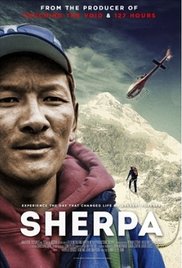
SHERPA
Australia/Nepal, 2015, 96 minutes, Colour.
Directed by Jennifer Peedom.
This documentary did not finish up in the way that the director intended. It turned out to be much more.
Writer-director, Jennifer Peedom, was interested in the recent almost-industry of Westerners wanting to climb Everest. She does fill in some of the background of the naming of Everest, the 1953 expedition, led by Sir John Hunt and an achievement for New Zealander Edmund Hillary. There are some visuals of this conquest of Everest. But, a name which became synonymous with this ascent of the mountain was that of Tensing, the Sherpa guide. Two of his sons do contribute some commentary to this documentary.
It was the Sherpas and their role that interested the director. She introduces us to one of the Sherpas who had made the ascent 22 times. We see his wife and family and his wife’s reluctance for him to continue climbing the mountain. There have been many Sherpas employed in working on the mountain – the Sherpas considering the mountain as rather sacred, sacred ground, divine or transcendent presence, and have treated the mountain accordingly.
This is in contrast with the Westerners who see scaling Everest as action, something to be achieved. This materialistic aspect is reinforced by the role of the Sherpas especially in carrying all the goods and equipment up the mountain, even with a scene showing the Sherpas serving tea to the climbers in their tents in the morning.
There are a lot of scenes at base camp, and especially with New Zealander Russell Brice who, for many years, has managed ascents, and is interviewed several times during the film.
This perspective changed when a number of Sherpas were killed in the sudden avalanche in 2014. More consideration was given to the Sherpas, their families, the tradition of ascending the mountain, the exploitation as it seemed by Westerners, the inequality in pay, and the Sherpas in the 21st century becoming much more conscious, especially through social media, of work and conditions.
The film also highlights a clash in 2013 when one of the climbers swore vehemently at a Sherpa and the guides took offence, demanding an apology – which was given, but highlighted the superiority attitudes of the climbers. This was reinforced with the reactions to the cancellation of the 2014 ascents after the option was given to the Sherpas to work or not. They chose to retire.
So, a film which serves as providing magnificent scenery and tracing the history of the increasing number of climbers (at one stage a long line tracking up the mountain side of people waiting to ascend) turns into a plea for consideration of the Sherpas and a reassessment of Western attitudes and behaviour.
And then came the 2015 devastating earthquake in Nepal.
1. Acclaim for the documentary?
2. The title, the history of the Sherpas in the Himalayas, Mount Everest? The documentary material on the conquest of Everest, John Hunt, Edmund Hillary, Tensing? The achievement? The consequences with so many wanting to climb Everest?
3. The introduction to the Sherpas, as a group, their families, their work as guides, carrying the equipment and goods to the top of Everest, the 2014 tragedy and their reaction?
4. The photography, high altitude, scenic, atmospheric, the mountains, Everest, Nepal, the base camp, the detail of climbing the mountains? Avalanche? The musical score?
5. The suddenness of the tragedy, the avalanche, its impact, the number of dead? The Sherpas?
6. The director, her initial intentions, with Russell Brice, at the base camp, the climb? Her interest in the Sherpas and the situation? The change because of the avalanche? His becoming a focus of the film and the Sherpa reaction?
7. The Sherpa and his family, 22 ascents, his wife, his work, his wife wanting him not to climb?
8. The interviews with Tensing’s sons, their views about the father, the history, the Sherpas?
9. Climbing Everest, the situation, the heavy traffic, the scene of the line of people waiting for the ascent? Westerners, wealthy, wanting an achievement? Expectations? The role of the Sherpas – even as servants serving the tea? Carrying the goods? The expectations, Western arrogance? The role of the companies and the commercialisation of the ascent of Everest?
10. Russell Brice, the interviews, his being there for a long time, his experience, dealing with the clients, dealing with the Sherpas?
11. The episode of the man swearing at the Sherpas, his arrogance, their reaction, his apologies, a changing point in the attitude of the Sherpas?
12. The film showing Sherpa consciousness, their being exposed to social media, awareness of inequalities, revolting against the situation?
13. The avalanche, the tragedy, the religious dimensions and the Sherpas not wanting to climb, the decision? The reaction of the westerners?
14. The information about the 2015 earthquake in Nepal and its consequences?
15. The focus on Everest, on the Sherpas and their role in social change them?